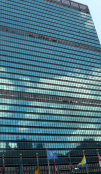Fifth Review Conference of the Chemical Weapons Convention - EU priorities to reinforce the Convention in a challenging disarmament environment

When States Parties meet in The Hague to review the Chemical Weapons Convention (CWC) from 15 to 19 May, they look at one of the most successful disarmament and non-proliferation treaties.
- It is almost universal - only four states remain outside the Convention[1].
- Over 99% of the world’s declared chemical weapons stocks have been verifiably destroyed, with completion of the destruction expected later this year.
However, chemical weapons were used on several occasions over the last years and remain a serious threat to international peace and security.
At the Review Conference, States Parties will be called up to strengthen the global norm against chemical weapons to make sure they will never be used again. They also have the possibility outline the priorities for the future implementation of the Convention and the work of the Organisation for the Prohibition of Chemical Weapons (OPCW), the Convention’s implementing body.
What is the EU’s role in the Review Conference?
The EU is a strong supporter of the Chemical Weapons Convention as a cornerstone of the international non-proliferation and disarmament regime.
In February 2023, the EU’s Foreign Ministers adopted Council Conclusions to set out the EU position for the Review Conference. This clear and early positioning underlines the importance the EU and its Member States attach to the CWC and to achieving a substantial outcome. EU Member States have actively contributed to the preparations of the conference with an aim of building consensus, so that all States Parties can agree on a strong outcome document. The EU and its Member States will continue this constructive work by seeking dialogue with all States Parties during the Review Conference itself.
Calling out the use of chemical weapons
The bottom line of the Convention is clear: no one should use of chemical weapons - be it a State or a non-State actor - anywhere, at any time and under any circumstances. Until today, 193 states – including all EU Member States - have committed to never and under any circumstances develop, produce, stockpile or use chemical weapons.
However, some countries – amongst them Members to the Convention - have not kept their commitment. In the last years, chemical weapons have been used with deadly consequences:
- The UN and the OPCW have independently attributed nine cases of chemical weapons use to the Syrian regime.
- In the United Kingdom, senior officials from the Russian military intelligence service were involved in the poisonings of Sergei and Yulia Skripal with a nerve agent “Novichok”.
- In August 2020, a “Novichok” was used in the assassination attempt on the Russian opposition politician Alexei Navalny in the territory of the Russian Federation, which has yet to be investigated in a transparent manner.
Only by acknowledging the past will it be possible to build the foundation for a world in which chemical weapons will no longer be used: For the EU it is clear that when evaluating the progress of the Chemical Weapons Convention, States Parties must use the Review Conference to address those cases. They especially need to condemn the repeated use of chemical weapons by the Syrian Arabic Republic, which has been reported by the OPCW Investigation and Identification Team (IIT). Calling out violations of the Treaty is necessary to protect the core of the Convention and uphold international law. It is also important to hold those who have used chemical weapons accountable. The OPCW Investigation and Identification Team (IIT) independent investigations and professional reporting on the use of chemical weapons in Syria lays the foundation for this and is an important contribution to efforts to end impunity.
Priorities to strengthen the Chemical Weapons Convention for the future
The Review Conference is also an opportunity to map out the areas for further strengthening the Convention:
- Convincing States not yet party to join the Convention - this should remain a main concern until the world’s entire population lives under the protection of the CWC.
- Mapping out the OPCW’s work after the last declared stockpiles have been destroyed. While regular inspections should continue, the OPCW must also be equipped to perform missions to investigate alleged uses of chemical weapons. In light of developments in science and technology, the Convention’s verification system must be adapted.
- Continuing to build national and international capacities and promoting peaceful uses of chemistry. The EU has supported this in the past and will do so in the future.
- Broadening perspectives by building on the progress towards a more diverse OPCW Technical Secretariat and deepening cooperation with a broad variety of external stakeholders, ranging from chemical industry to think tanks, academia, civil society and non-governmental organisations.
EU support to the implementation of the Chemical Weapons Convention
The EU is the biggest contributor of voluntary funding to the OPCW through projects financed via the EU budget and via individual EU Member States’ national budgets. This aims at strengthening the organisation’s work towards implementing the Chemical Weapons Convention.
Since 2004, The European Union has provided over EUR 38 million to projects supporting capacity building, working towards the CWC’s universalisation, establishing the new OPCW ChemTech Centre, enhancing the organisation’s Cyber security and information protection as well as providing satellite imagery in support of its activities.
[1] Israel signed, but has not ratified the convention; Egypt, North Korea and South Sudan have neither signed nor acceded to the treaty.




